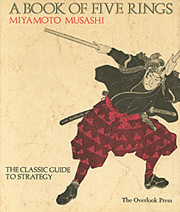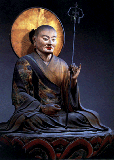What is Mu Shin?
In Japanese martial arts the training of the mind has always been at least as important as the training of the body - if not more so. One of the reasons for practising mental control is that an uncluttered mind will quicken your reaction time. When faced with an attack the most salient factor tends to be the speed with which you recognise and respond. At a basic level of competence, reaction to attack is simply a conditioned reflex, but at higher levels of martial arts this is not as desirable as it may seem. The beginner may think being able to "react without thinking" shows the highest level of attainment. No so. If people are trained to react reflexively in a certain way this can very easily be turned to their disadvantage. Do not fix your mind on things as they are not always as they seem. Skill in self-defence is not gained by slavish mechanic repetition. Technique has its place, but so too does instinct. The true expert must always be ready to adapt at a fraction of a second's notice.
Mu-Shin, a Japanese concept, means "no mind". That does not mean "mindless", rather that when you enter a state of mu-shin you are void of thought, you have no emotion, no expectations or anticipation. The idea behind this is that you leave your mind and let your body do what it has been trained to do. It is essential not to be too tense since this can inhibit movement, nor so relaxed that you become careless, dreamy or sloppy. In practice this means you retain an awareness of a situation at least on a moral and ethical level. You want to be in control of yourself.
Mu-Shin is something to strive for in your martial arts training. It is not easily attained. Once mastered, it can be applied in all aspects of living, to great advantage.


 According to legend, Emperor Chuai died while at war with Korea around 190AD and his wife, pregnant with Ojin, amassed an army and crossed the sea to Korea to avenge her husband. The legend tells that while at sea the baby was ready to be born, but the Empress spoke to her unborn child "If you are a prince, you must listen. I am crossing the sea to attack the enemy of your father. Since I am only a woman, I want you to act as my commander in chief. If you are destined to be sovereign of Japan you must remain unborn during the time of the battle and command the ten thousand horsemen of your army. If you do not heed these words and insist on being born at once I will cast you into the sea".
According to legend, Emperor Chuai died while at war with Korea around 190AD and his wife, pregnant with Ojin, amassed an army and crossed the sea to Korea to avenge her husband. The legend tells that while at sea the baby was ready to be born, but the Empress spoke to her unborn child "If you are a prince, you must listen. I am crossing the sea to attack the enemy of your father. Since I am only a woman, I want you to act as my commander in chief. If you are destined to be sovereign of Japan you must remain unborn during the time of the battle and command the ten thousand horsemen of your army. If you do not heed these words and insist on being born at once I will cast you into the sea".  Hannya is the name of the fearsome face. According to Wikipedia, the name hannya (般若) is a Sino-Japanese word for
Hannya is the name of the fearsome face. According to Wikipedia, the name hannya (般若) is a Sino-Japanese word for  KOKORO 心 means "heart" in English. It is your will to survive even when the odds are against you. It is also partly your dedication to your training or your job or whatever way it is that you follow. A person who has a strong spirit has much kokoro. Someone with much kokoro can endure through many hardships in his or her life. This means that you should fight for what you believe in, but do not fight just to persuade others to believe in the same thing. An example is if someone tries to force you to do something that is against your beliefs - this is when you should fight for what you believe in. However, if someone says your beliefs are stupid, that doesn't mean you should beat them up or even become angered by their attitude. People are entitled to their beliefs just as you are to yours. The only one you need to prove your beliefs to is yourself.
KOKORO 心 means "heart" in English. It is your will to survive even when the odds are against you. It is also partly your dedication to your training or your job or whatever way it is that you follow. A person who has a strong spirit has much kokoro. Someone with much kokoro can endure through many hardships in his or her life. This means that you should fight for what you believe in, but do not fight just to persuade others to believe in the same thing. An example is if someone tries to force you to do something that is against your beliefs - this is when you should fight for what you believe in. However, if someone says your beliefs are stupid, that doesn't mean you should beat them up or even become angered by their attitude. People are entitled to their beliefs just as you are to yours. The only one you need to prove your beliefs to is yourself.